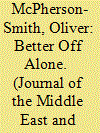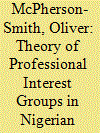|
|
|
Sort Order |
|
|
|
Items / Page
|
|
|
|
|
|
|
| Srl | Item |
| 1 |
ID:
178881


|
|
|
|
|
| Summary/Abstract |
Somalia is a country of two realities: the internationally recognized Federal Republic of Somalia and the self-declared Republic of Somaliland. While the Federal Republic endures chronic instability and unrest, Somaliland has established security, economic growth, and a functioning government. This article argues that a significant contributing factor to this divergence is the radically different colonial regimes that ruled the two regions before their unification and independence in 1960. British rule in British Somaliland sought primarily to deny other empires control of the Protectorate and to trade livestock with the indigenous communities. Italy, however, engaged in a protracted and violent effort to establish a plantation colony in Italian Somaliland. Drawing from colonial-era sources and with a focus on the earliest years of imperial and Somali engagement, this article situates the long-run divergent trajectories of British Somaliland and Italian Somaliland within the broader literature on colonial institutions and long-run economic development.
|
|
|
|
|
|
|
|
|
|
|
|
|
|
|
|
| 2 |
ID:
186630


|
|
|
|
|
| Summary/Abstract |
Discussions about state capacity and special economic zones (SEZs) arise in disparate academic circles, despite the fact that they both often address the relative level of state intervention in economic activity. Can the economic limitations of low state capacity be mitigated by the benefits of an SEZ? Drawing from interviews with non-governmental organization workers, bureaucrats and traders in the Gorno-Badakhshan Autonomous Oblast (GBAO) region of Tajikistan, this paper presents the case of the Tajik–Afghan cross-border free-trade markets as an example of a popular SEZ in a region marked by enduring diminished administrative state capacity. Highlighting the use of the administrative capacity of non-state actors, and its periodically contentious intersection with state coercive capacity, this paper illustrates the novel creation of SEZs to facilitate economic growth in contexts of enduring low administrative state capacity.
|
|
|
|
|
|
|
|
|
|
|
|
|
|
|
|
| 3 |
ID:
191897


|
|
|
|
|
| Summary/Abstract |
Professional or industry-based interest groups have long been a feature of the Nigerian political landscape. Nevertheless, studies of these interest groups in Nigerian politics have largely privileged the analysis of individual groups or considered their collective role in the democratic transition of the 1990s. By returning the scholarly focus to their raison d’être, namely, their shared economic concerns, this article offers a comprehensive theory of interest groups in Nigerian politics. This novel theory posits that federal-level interest groups draw their membership from across Nigeria’s diverse ethnic, regional, and class constituencies due to their common economic concerns. Moreover, these groups actively lobby the federal government in pursuit of their economic advantage, often in direct competition with each other. Neither aloof from nor coopted by the state, the most prominent interest groups in Nigeria enjoy formalized positions within the bureaucracy from which to exert their influence and pursue the unique interests of their members. To develop this theory, this article employs new data and documents on the lobbying efforts of interest groups during the reform process of corporate law in Nigeria across a thirty-year period. Elite interviews, previously unpublished documents, and archival legal documents evidence their lobbying efforts. Examining the reform of corporate law across Nigeria’s later military regimes and the democratic Fourth Republic (1999–present) demonstrates the relevance of this theory of interest groups for both historical and contemporary understandings of Nigerian politics.
|
|
|
|
|
|
|
|
|
|
|
|
|
|
|
|
|
|
|
|
|